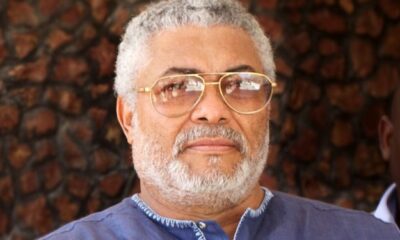GENERAL NEWS
IMANI RETRACTS ‘INJURIOUS STATEMENTS’ AGAINST DR. K.K. SARPONG, FUELTRADE
Policy think tank, IMANI Africa, has apologised “unreservedly” to the Chief Executive Officer of the Ghana National Petroleum Corporation (GNPC), Dr K. K. Sarpong, and Fueltrade Limited, a mid and upstream petroleum company, for “injurious statements” made against them on April 25, this year.
In a three-paragraph press statement titled ‘Retraction and Apology to Dr KK Sarpong and Fueltrade Limited,’ a copy of which is available to the Daily Graphic, the think tank also retracted the statements that its Vice-President, Mr Kofi Bentil, made against Dr Sarpong and Fueltrade at its press conference on the petroleum sector last month.
The statement, issued on May 5, was signed by Mr Bentil.
Conflict of interest
At the press conference, which focused on issues relating to the operations of Aker Energy in Ghana and the Deepwater Tano Cape Three Points (DWT/CTP) block, Mr Bentil alleged that Dr Sarpong and his family owned Fueltrade, which held two per cent as a local partner of the DWT/CTP Petroleum Agreement.
With Dr Sarpong being the CEO of the GNPC, another partner of the DWT/CTP with a 10 per cent stake, Mr Bentil said it was ethically wrong for a company that he and his family owned to also be a partner of the block.
Consequently, Mr Bentil concluded that Dr Sarpong was in a conflict of interest situation.
However, moments after the press conference, the GNPC CEO denied IMANI’s claims, describing them as false.
He said in a press statement that: “I wish to state emphatically that neither I nor my family own Fuel Trade as claimed by IMANI Ghana“ and further demanded “a retraction of the said claim and an unreserved apology from IMANI and its Deputy Director, Mr Bentil, within two weeks.
Similarly, Fueltrade said in a separate release that Dr Sarpong was not its owner contrary to IMANI’s claims.
Like Dr Sarpong, they also called for an apology and retraction.
*We’re sorry*
*In the statement, IMANI said: “Kofi Bentil and IMANI Africa issue this statement and unreservedly retract and apologise to Dr K.K. Sarpong and Fueltrade Limited for injurious statements made at IMANI Africa’s April 25 forum.*
“In the said forum, as we laid out issues over a 21-slide presentation aimed at bringing focus to some pertinent issues in Ghana’s young oil industry, one of the slides mentioned Dr K. K. Sarpong and Fueltrade in ways they disapproved of, for which Dr Sarpong and Fueltrade have demanded a retraction and apology.
We, therefore, apologise unreservedly and retract same,” it concluded.
GENERAL NEWS
Renowned Radio Personality, DJ Foxx Bids Farewell To Beloved Mother

The entire media fraternity and beyond is mourning with celebrated radio personality, DJ Foxx, as he lays his dear mother, Madam Sarah Amoah, to rest on June 29th, 2024.
The revered afternoon drive time host on Breeze 90.9 FM will bid a final farewell to his cherished mother, fondly known as Maame Fante, in a series of solemn ceremonies spanning from June 29th to 30th, 2024, at Methodist Park, Ablekuma Agape, Accra.
Madam Sarah Amoah, a pillar of kindness and compassion, leaves behind a legacy of warmth and generosity, having touched countless lives with her boundless love and respect for all. Her remarkable life, spanning 69 years, will be celebrated in a dignified burial and final funeral rites on June 29th, followed by a Thanksgiving service on June 30th.
DJ Foxx extends a heartfelt invitation to his colleagues in the media, friends, family, and the general public to join him in paying their last respects to his beloved mother.
Let us come together to mourn the loss of an extraordinary woman and offer support to DJ Foxx during this difficult time.
For further information and inquiries, please contact:
Bro Emma: 0242310871
Bro Dave: 0550994252
May Madam Sarah Amoah’s soul rest in eternal peace.
GENERAL NEWS
Mightily Miracles recorded as Apostle Johnson Suleman storms South America with Jesus Christ

In recent times, the global Christian community has witnessed a remarkable wave of miracles, signs, and wonders, all credited to the popular renowned Nigerian Pastor, Apostle Johnson Suleman of Omega Fire Ministries Worldwide. As if a tsunami of divine intervention, Apostle Suleman has taken South America, particularly Venezuela, by storm, leaving an indelible mark on the hearts of the people.

The mega crusade in Venezuela, aptly themed “Power As Of Old” #Intimacy2024, became the perfect platform for Apostle Suleman to showcase the power and glory of Jesus Christ.
The event, which attracted thousands of worshipers, witnessed awe-inspiring, supernatural occurrences that left the Venezuelan crowd astounded. The testimonies of the people were filled with expressions of awe and amazement, as they exclaimed, “We have not seen these before – mighty miracles, signs, and wonders as of bible days.”
This display of God’s power through Apostle Suleman’s ministration resonated deeply with the attendees, who eagerly sought divine intervention in their lives. The atmosphere was charged with fervor and faith, as Apostle Suleman’s powerful sermons and prayers ignited the hearts of the people, instilling in them a renewed sense of hope and belief in the miraculous through the power of our Lord Jesus Christ
Watch Video:
Nigerians reacts at Apostle Johnson Suleman’s Humanitarian Gesture in Venezuela 🇻🇪
@James_samson says “9ja Bloggers will not see this one to blog, always negative and toxic, Apostle Johnson Suleman is indeed a world figure for real”.

@IjeomaJohnson_
says “This is what true Christianity should be about, we’re so proud of you Apostle as you’re taking Nigeria’s flag across the globe for good”.
-

 ENTERTAINMENT4 weeks ago
ENTERTAINMENT4 weeks ago14th City Hills Foklex Media Awards: Full List of Nominees Revealed
-

 MUSIC3 weeks ago
MUSIC3 weeks agoEid Mubarak: Magic Rocker Unveils Heartwarming Tribute “Abinchi Maidaadi”
-

 MUSIC3 weeks ago
MUSIC3 weeks agoPriestMadeIt’s “Monaco” Takes Listeners on a Sonic Baecation Getaway
-

 MUSIC2 weeks ago
MUSIC2 weeks agoGbona: Amapiano and Afrobeats Unite in Perfect Harmony
-

 MUSIC1 week ago
MUSIC1 week agoDeep Rankyn Recruits Mayoking On A New Song Titled “Odo Asem”
-

 MUSIC3 weeks ago
MUSIC3 weeks agoTakyi Kay Join Forces With King Paluta On ‘Free Your Mind’
-

 MUSIC3 weeks ago
MUSIC3 weeks agoImmerse Yourself in the Magic of “Money” By Fascination
-

 ENTERTAINMENT4 days ago
ENTERTAINMENT4 days agoMusic, Love, and Culture: Joseph Matthew’s Wedding Celebration



















